For some reason Xcode thinks I'm not implementing didFailWithError method of the CLLocationManagerDelegate protocol
I fail to see what I'm doing wrong, as I literally copied from another SO post that said this didFailWithErrormethod was updated for Swift 3. So I don't understand why Xcode thinks I'm not implementing didFailWithError
Any insight would be greatly appreciated!
Code
class OptionsViewController: UIViewController,
CLLocationManagerDelegate {
var locationManager: CLLocationManager = CLLocationManager()
override func viewDidLoad() {
//Ask user for location
locationManager.delegate = self
locationManager.desiredAccuracy = kCLLocationAccuracyBest
//Use users current location if no starting point set
if CLLocationManager.locationServicesEnabled() {
if CLLocationManager.authorizationStatus() == CLAuthorizationStatus.authorizedWhenInUse
|| CLLocationManager.authorizationStatus() == CLAuthorizationStatus.authorizedAlways {
locationManager.requestLocation()
}
else{
locationManager.requestWhenInUseAuthorization()
}
}
else{
//Alert user to open location service, bra bra bra here...
}
}
func locationManager(_ manager: CLLocationManager, didFailWithError error: Error) {
print("error:: \(error)")
}
func locationManager(_ manager: CLLocationManager, didChangeAuthorization status: CLAuthorizationStatus) {
print("didChangeAuthorization")
if status == CLAuthorizationStatus.authorizedWhenInUse
|| status == CLAuthorizationStatus.authorizedAlways {
locationManager.requestLocation()
}
else{
//other procedures when location service is not permitted.
}
}
func locationManager(_ manager: CLLocationManager, didUpdateLocations locations: [CLLocation]) {
print("Did update location called")
// let locValue:CLLocationCoordinate2D = manager.location!.coordinate
// print("locations = \(locValue.latitude) \(locValue.longitude)")
if locations.first != nil {
print("location:: (location)")
}
}

